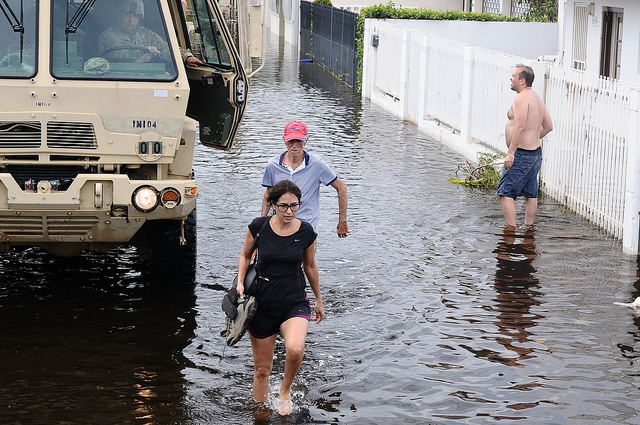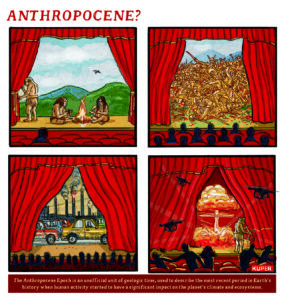Hurricanes Wreak Greater Havoc as Temperatures Soar
Devastation caused by the most powerful hurricanes has increased up to twentyfold, according to a newly identified pattern in natural disasters. Floods after Hurricane Maria in Puerto Rico. (National Guard / Flickr)
Floods after Hurricane Maria in Puerto Rico. (National Guard / Flickr)
The worst things that can happen could be about to get even worse. While the economic cost of the average flood, drought, windstorm, landslide or forest fire has crept up over the decades, the price exacted by the most extreme events – such as hurricanes Katrina in New Orleans in 2005 and Dorian over the Bahamas this year – has increased drastically.
Weather-related disasters have been steadily increasing for decades, driven by rising atmospheric temperatures as a consequence of profligate use of fossil fuels and other human actions.
Although better information, advance warning systems and community preparedness have in many ways reduced or contained the loss of life, the economic costs have risen, on average.
The average count is not the only one that matters, though. According to European and US researchers, the top 5% of all disasters are proving radically more expensive.
Extreme disasters
“When we get to the top 1%, damages increased approximately twentyfold between 1970 and 2010,” says Francesa Chiaromonte, a statistician at Pennsylvania State University in the US.
“This may be due to the fact that extreme disasters are now hitting temperate areas, as well as the fact that these areas are less prepared to deal with extreme disasters compared to tropical regions.”
The most powerful hurricanes, which would have caused $500 million in losses in 1970, are now costing $10 billion.
Chiaromonte and colleagues from the Sant’Anna School of Advanced Studies in Pisa, Italy, report in the Proceedings of the National Academy of Sciences that they deployed statistical wizardry to tease out the unexpected patterns from a mountain of data on decades of natural disaster.
The data was compiled by international agencies and governments, and also by insurance giants that last year paid out $80 billion in insured losses. Total disaster damage was perhaps twice that figure.
Human numbers have multiplied and economies have grown, so disaster damage will anyway have become more costly. But one of the earliest predictions from climate research was that, in a hotter world, the extremes of heat, drought, rainfall, tornado, wildfire, hurricane and tropical cyclone would become more intense, or more frequent, or both – with devastating consequences.
“We observed an increasing polarisation between poor and rich areas of the world for casualties caused by storms”
Concerted international and national action, orchestrated over the decades by what is now called the UN Office for Disaster Risk Reduction, has softened some of the impact, and has reduced loss of life in many cases.
Extreme droughts, the report’s authors say, have become less fatal. “So have extreme floods, but only in rich countries,” the report points out. “We observed an increasing polarisation between poor and rich areas of the world also for casualties caused by storms.
“Finally, and concerningly, extreme temperature events have become more deadly in poor and rich countries alike.”
In a deadpan conclusion, the authors point out that if the increase in the frequency and strength of natural disasters is in part due to climate change, then “mitigation is a logical instrument to reduce trends in damages”.
Your support matters…Independent journalism is under threat and overshadowed by heavily funded mainstream media.
You can help level the playing field. Become a member.
Your tax-deductible contribution keeps us digging beneath the headlines to give you thought-provoking, investigative reporting and analysis that unearths what's really happening- without compromise.
Give today to support our courageous, independent journalists.






You need to be a supporter to comment.
There are currently no responses to this article.
Be the first to respond.